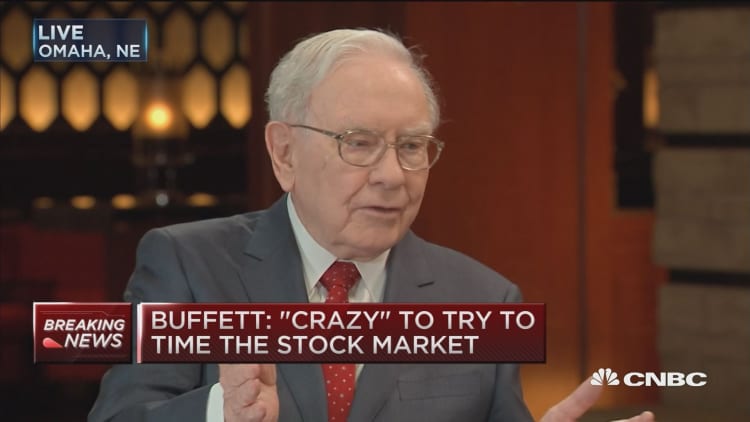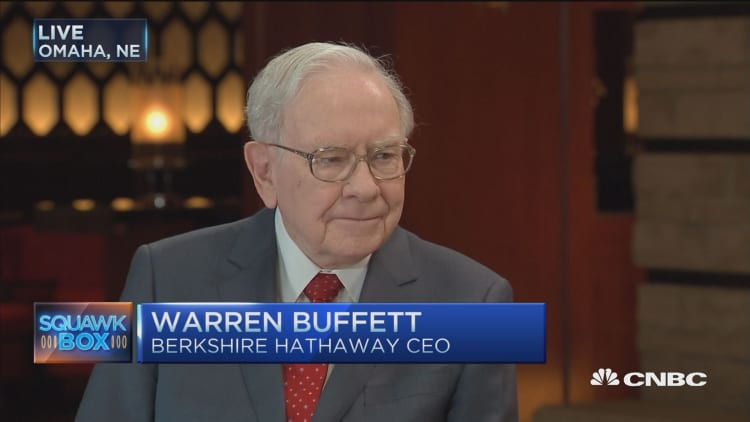



U.S. stocks closed lower Monday, despite gains in oil, as the S&P 500 and Nasdaq composite ended February with losses.
The S&P and Nasdaq posted their first three-straight months of losses since the five-month losing streak ended September 2011.
(Tweet This)
Traders attributed the decline in stocks largely to late-day sell orders around the month-end. Selling accelerated into the close, with the S&P 500 closing about 0.8 percent lower on the day, below its 50-day moving average and down 0.4 percent for the month.
The Dow Jones industrial average closed about 123 points lower to below its 50-day moving average, but still squeezed out a gain of 0.3 percent for the month, its best since November. Home Depot and UnitedHealth were the greatest contributors to losses.
The declines in stocks came despite a rise in oil. U.S. crude oil futures settled up 97 cents, or 2.96 percent, at $33.75 a barrel. WTI futures for April delivery rose 0.39 percent for February, its first positive month since October.
Health care closed more than 1.5 percent lower to lead declines on the S&P 500, while utilities was the only gainer. The iShares Nasdaq Biotechnology ETF (IBB) ended down 2.8 percent.
"I think today was a real nasty day for specialty pharma," said Paul Yook, portfolio manager at BioShares. He cited several negative headlines for the sector Monday, including news around Valeant Pharmaceutical
The stock closed down 18.4 percent after Bloomberg reported Valeant is under investigation by the SEC. The firm also withdrew prior guidance, rescheduled its fourth-quarter earnings call and said CEO Michael Pearson was back from medical leave.
Earlier, the major stock indexes attempted to hold gains after opening mildly lower.
"The fact that oil is up big and the market isn't up big concerns me, but what's going on is the market's a little bit tired," said Matthew Tuttle, chief investment officer of Tuttle Tactical Management.
"The market's already had a big move off the 1,812 area and it's just tired at this point," he said, noting a struggle for the S&P 500 to get far past the 1,950 level.
Major averages 5-year performance
In economic news, Chicago PMI came in at 47.6 in February, missing expectations and dropping from 55.6 in January. Pending home sales fell 2.5 percent in January, versus expectations for a slight gain.
Stocks held little changed after the data, an indication of "underlying strength based on expectations of economic growth" later this year, said Ben Pace, chief investment officer at HPM Partners.
"Nothing's pointing to a U.S. recession, nor a more aggressive Fed," said Art Hogan, chief market strategist at Wunderlich Securities.
Key data for the week include ISM manufacturing on Tuesday and the jobs report on Friday.
Treasury yields were little changed, with the near 0.79 percent and the 10-year yield a touch lower at 1.74 percent.
Read MorePro Uncut: Interview with Nigerian oil minister
European equities came off session lows to close mixed after China's central bank announced further stimulus measures.
The People's Bank of China cut further the reserve requirement ratio, the amount of cash the country's banks have to hold, by 0.5 percentage points after China's markets closed Monday. The cut was the first since October and the fifth since last February.
The reserve requirement ratio comes into effect Tuesday and means most large Chinese banks will have a reserve ratio of 17 percent, Reuters said.
Asian equities closed mostly lower, with the Shanghai composite down about 2.9 percent but above session lows and the Nikkei 225 reversing gains to close down 1 percent.
U.S. stock index futures tried for gains as the opening bell approached, helped by a rise in U.S. crude oil futures to above $33 a barrel.
"I still think oil is by far the primary driver of the market at the moment," said Randy Frederick, managing director of trading and derivatives at Charles Schwab.
Read MoreMarch could come in like a bull but red flags are waving
After the conclusion of the G-20 meeting over the weekend, the Chinese yuan midpoint fix against the dollar was 6.5452, the softest in almost a month and 0.17 percent weaker than the previous fix of 6.5338, Reuters said.
The U.S. dollar index traded mildly higher after hitting its highest since Feb. 3. The euro was near $1.088 after dipping to its lowest against the dollar since Feb. 1. The yen traded at 112.75 yen against the greenback while pound sterling held near $1.3900.
Euro zone inflation data showed a drop to minus 0.2 percent, boosting expectations of more policy easing when the European Central Bank meets on March 10.
The Dallas Fed general business activity for February was negative 31.8, slightly better than the minus 34.6 January read but holding in negative territory for a 14th-straight month.
Major U.S. Indexes
The Dow Jones industrial average and Nasdaq composite ended February 10 percent or more below their 52-week intraday highs, in correction territory. The S&P 500 was within 10 percent of its 52-week intraday high, out of correction territory.
The Dow transports closed down 0.8 percent Monday but gained 6.35 percent for February, their best month since January 2013.
The Russell 2000 lost 0.3 percent Monday and ended February down 0.14 percent, for its third-straight monthly decline.
On Friday, the S&P 500 and Dow Jones industrial average closed above their 50-day moving averages.
"The SPX cleared short-term resistance last week, but we expect upside follow-through to be limited by short-term overbought conditions," BTIG Chief Technical Strategist Katie Stockton said in a note.
Read MoreEarly movers: CNX, C, LL, FDML, SYY, AMC, SBUX, UTX, DIS & more
The Dow Jones industrial average closed down 123.47 points, or 0.74 percent, at 16,516.50, with Caterpillar leading advancers and JPMorgan Chase the greatest decliner.
The Dow gained 0.30 percent for February, with DuPont up almost 15.4 percent as the top gainer and Microsoft down 7.6 percent as the worst performer.
The closed down 15.82 points, or 0.81 percent, at 1,932.23, with health care leading nine sectors lower and utilities the only gainer.
The index lost 0.41 percent for February, with financials falling nearly 3.2 percent as the worst performer and materials up 7.3 percent as the best performer.
The Nasdaq composite closed down 32.52 points, or 0.71 percent, at 4,557.95.
The Nasdaq fell 1.21 percent for the month. Apple declined 0.67 percent for the month. The iShares Nasdaq Biotechnology ETF (IBB) lost 4.85 percent for February.
The CBOE Volatility Index (VIX), widely considered the best gauge of fear in the market, held near 20.5.
Advancers were a touch ahead of decliners on the New York Stock Exchange, with an exchange volume of nearly 1.3 billion and a composite volume of 4.4 billion.
Gold futures for April delivery settled up $14 at $1,234.40 an ounce. Gold gained 10.57 percent for February, its best month since January 2012.
MSCI on Monday also rebalanced several of its major indexes including the MSCI US Equity Large Cap 300 Index. The three largest deletions from the index were Continental Resources, Marathon Oil and Freeport-McMoRan, according to a release. Changes are effective Tuesday.
On tap this week:
Monday
11:30 p.m.: New York Fed President William Dudley speaks in China
Tuesday
Super Tuesday, auto sales
Earnings: Barclays, AutoZone, Kate Spade, Medtronic, Luxottica Group, Ross Stores, Bob Evans
February vehicle sales
9:45 a.m. Manufacturing PMI
10 a.m. ISM manufacturing; construction spending
Wednesday
Earnings: Costco, Semtech, Pure Storage, Brown-Forman, Abercrombie and Fitch
7 a.m.: Mortgage applications
8:15 a.m. ADP employment
11 a.m.: San Francisco Fed President John Williams speaks
10:30 a.m.: Oil inventories
2 p.m. Beige book
Thursday
Earnings: Kroger, Royal Ahold, Barnes and Noble, Joy Global, Broadcom, Embraer, Ciena, Trina Solar, Cooper Cos.\
7:30 a.m.: Challenger Job-Cut report
8:30 a.m. Initial claims; productivity and costs
9:45 a.m. Services PMI
10 a.m. ISM nonmanufacturing; factory orders
10:30 a.m.: Natural gas inventories
10:45 a.m.: Dallas Fed President Rob Kaplan speaks
Friday
Earnings: Staples, WPP Group
8:30 a.m. Employment report; international trade
1 p.m.: Oil rig count
1 p.m.: Dallas Fed President Rob Kaplan speaks
*Planner subject to change.
More From CNBC.com:




